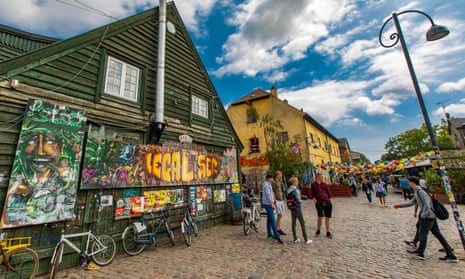The 40-year history of the open cannabis trade on “Pusher Street” in the heart of the anarchist Christiania neighbourhood of Copenhagen could be over as the city’s mayor said she was willing to shut it down over the commune’s fears about rising gang violence.
Christiana is a self-proclaimed autonomous commune in the Danish capital that has been allowed to effectively run itself as a “social experiment” since the 1970s despite periodic threats of a clean-up by national governments.
At its heart is Pusher Street, where stalls operated by locals openly sell cannabis, but ever-worsening violence in the “green light” district, as organised criminal gangs have moved in and vied for dominance, has prompted growing concerns over residents’ safety.
The mayor of Copenhagen, Sophie Hæstorp Andersen, has now warned in an interview with the Ekstra Bladet newspaper that the violence has to end and offered to close Pusher Street’s drug trade down if the 1,000 people living in the Christiania commune agree.
Andersen said: “The violence and crime around Pusher Street has now reached a level we neither can nor want to deal with.
“In Copenhagen, I believe we must have room for Christiania. It is both skewed and alternative. It’s creative. But this harsh, organised violence must be written out of the future around Christiania.
“That is why my message is also that if the Christianites make it clear that they are ready to close Pusher Street and replace it with something else then we in the municipality of Copenhagen are ready to support putting together a plan to find out what should happen to the street.”
More than half a century ago, squatters broke down the barricades of the Bådsmandsstræde military base on the island of Amager to form a commune in the centre of Copenhagen. In 1973, the Social Democratic government gave Christiania the official temporary status of “social experiment”, allowing it informal autonomy.
A majority vote in parliament in 1989 set the Christiania Law in stone, legalising the squat and the practice of residents contributing to the communal running costs of Christiania’s postal service, rubbish collection and children’s nurseries. The Copenhagen police are not welcome and a local form of justice is applied.
The Christianites describe themselves as “anarchists with rules” but the commune’s spokesperson, Hulda Mader, has in recent days spoken of receiving death threats after trying to intervene in clashes between drug gangs. There has been a recent spate of stabbings and in October a 22-year-old man was shot dead.
“There have been several violent episodes recently,” Mader said. “These are not people we know. We suspect that it is gangs. We are afraid that the situation will develop into a gang war in Christiania.
after newsletter promotion
“When we Christianites tried to stop the hashish snakes, we were threatened with our lives. Enough is enough. We have disclaimed responsibility for what happens on Pusher Street.
“It is not something that we, as private individuals, can oppose. Now there have been repeated episodes of violence, and we simply think that it has become too dangerous for us.”
Andersen said a forum for discussion over a new local plan had been established between the Fristaden Christiania foundation, which runs the area, and the Copenhagen municipality and police.
She said: “This is a proposal I am making partly because I am talking to Christianites who want an end to Pusher Street and the raw violence we see with gangs. And partly because the violence has reached a level we neither can nor want to find ourselves in as a city.”
